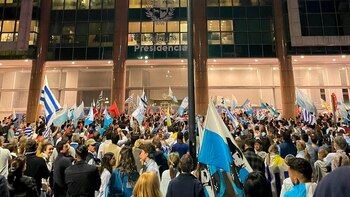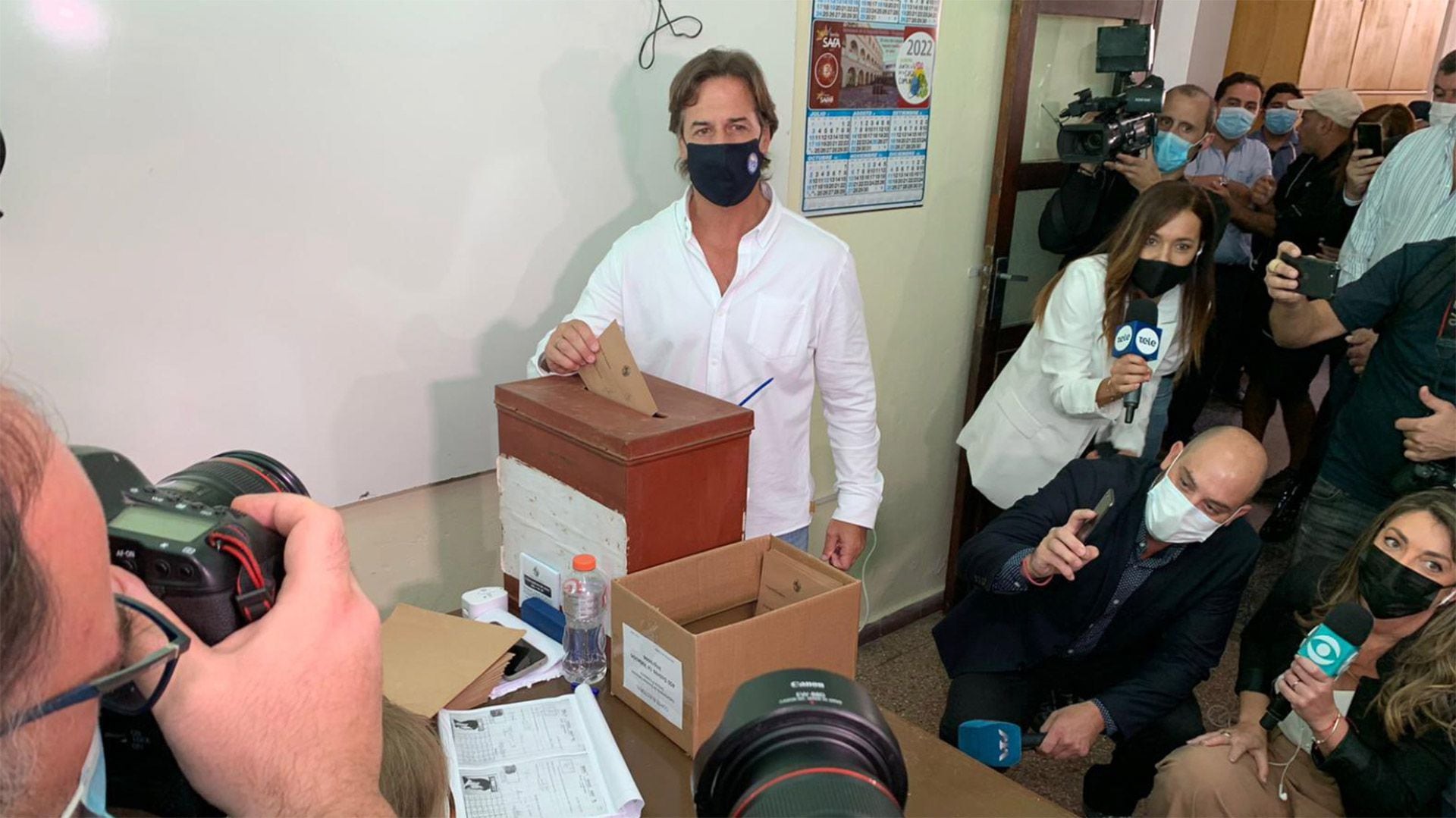
The Uruguayan citizens voted on March 27 the referendum to repeal 135 articles of the Urgent Consideration Law (LUC) and after 00:00 hours, in the early morning of March 28, it was confirmed that the government of Luis Lacalle Pou managed to keep its comprehensive reform intact.
With nearly 100% of the votes counted, the “No” won more than 50.51% of the votes, which means that the 135 LUC articles that were in dispute will remain in force. The campaign for “Yes” won 49.49% of the votes, which was expected in a previous scenario marked by parity. The last polls prior to the political ban agreed on a result with a high percentage of undecided and similar results.
The Urgent Consideration Law, known by its acronym “LUC”, is a law that reached the Uruguayan Parliament thanks to the government of Luis Lacalle Pou in March 2020, at the beginning of his term. It was the first law enacted by the Executive Branch, which passed with a parliamentary majority thanks to the “multicolored coalition”, a group of center-right parties that was formed during the election campaign.
This is a set of 476 articles that changed several norms and became the flagship law of the government of Luis Lacalle Pou. Those questioned were 135 articles within the law.
The regulation deals with articles related to safety and public education reforms, mainly, and other types of topics ranging from rents to fuel prices.
Blank votes counted as votes in favor of “No”, while “Yes” would only have won the referendum appeal if it had received 50% of the valid votes + 1. Valid votes are those votes for the ballots and also the blank votes. Cancelled votes do not fall into this category.
During this ballot, which was of a secret and compulsory nature, there were 2,684,131 persons qualified to vote.
At approximately 22:00 hours, the president of the Frente Amplio, Fernando Pereira, gave a speech and said: “I don't know how they will explain it, with all the power, with the press conference, with all the media, with the whole structure in their favor, we made them an even match and with 15 minutes more sure we won it.”
“We Uruguayans showed that half of us are on this side. What ruler would not listen to one half with attention and sensitivity?” , asked the leader.
“It is something rarely seen, against all the odds and the polls. At this hour they cannot say that “NO” won, because there is nothing more powerful than a people fighting, transforming. There is nothing and no one more powerful,” he added.
For his part, once the results were known, President Lacalle Pou gave a press conference where he began by saying that “it can be clearly established that the votes necessary for the repeal of the 135 articles have not been reached.” He was accompanied at the table by Vice President Beatriz Argimón, the Deputy Secretary of the Presidency, Rodrigo Ferrés, the Secretary of the Presidency, Álvaro Delgado, and the entire Cabinet of Ministers stood behind him.

“The government did not come with a bill, with a text and said this is what is going to be voted on,” said the chief, adding that “it was a majority that listened, dialoged, modified and carried out the LUC.”
He stressed that the LUC “is a law designed for the good of all Uruguayans” and that “it is an instrument” of government that he is convinced of. “Tomorrow we are back on our issues, issues that are urgent, issues that we have been working on even despite the pandemic, so as president of all Uruguayans on behalf of the entire Council of Ministers: it is a stage passed, a law that remains firm,” he emphasized.
Among several issues, Lacalle Pou highlighted his “personal support for all the police men and women in the country who were unfairly used these days in the campaign.” In addition, he announced that “this week we are going to have an important meeting on the topic of prices. They know that we have already taken some action and this coming week we are going to have other actions in the different products of the basic basket of the Uruguayans.”
The day of March 27
During the civic day, several politicians came forward to vote during the morning. The first was former President José Mujica, who appeared in the Cerro neighborhood, in the west of the country, at 8 in the morning. There, with regard to the campaign for “No”, he declared that in this referendum “it is the first time that a president has entered an electoral campaign.”

Before noon, figures such as Lucía Topolansky, former senator and wife of José Mujica; Defense Minister Javier García; Oscar Andrade, Senator for the Broad Front and leader of the Communist Party in Uruguay; Vice President of the Republic Beatriz Argimón; the Mayor of Montevideo, Carolina Cosse; the senator of the Cabildo Abierto party, Guido Manini Ríos; and the Mayor of Maldonado who voted for the east of the country, Enrique Antía.
“Throughout the country, the electoral process is taking place normally. The civility of the Uruguayan people is once again manifest,” said the Director General of the Secretariat, Luis Calabria, on Twitter about what happened before the afternoon.
Since last Thursday night, the ban on proselytizing propaganda in print, radio or television media and, since Friday, the ban on the sale of alcoholic beverages has been in force. During the day, it was forbidden to hinder the traffic of voters, to disturb them in the exercise of the vote or to cause disturbances, riots or aggressions that would prejudice the regular conduct of the electoral event. Violation of any of these elements would have been considered an “electoral crime”.
In addition, during voting hours, ballots could only be delivered to a ballot greater than 100 meters from each electoral circuit and public shows in open or closed places, demonstrations or public meetings of a political nature were prohibited.

At ten o'clock in the morning, supporters of Luis Lacalle Pou approached the official residence to give him support before he went out to vote in Canelones, the department bordering Montevideo. At about eleven in the morning he presented himself to the Guadalupe de Canelones Lyceum, where a group of followers stopped him to take pictures and greet him.
“This law has a large percentage of articles voted by everyone, and that is not less,” he told the press after leaving the circuit.

In the afternoon, former President Julio María Sanguinetti came to vote, who considered that the current president “has intervened very little”, even though the Broad Front has criticized his participation. Also presented were Lorena Ponce de León, the president's wife; Fernando Pereira, the president of the Broad Front; the Senator of the National Party, Gustavo Penadés; the secretary of the Presidency Álvaro Delgado; the mayor of Canelones, a member of the Broad Front, Yamandú Orsi;
The Minister of the Electoral Court, José Garchitorena, said on Twitter that by 12:00 there had been 36% participation after conducting a survey of 82% of circuits. By 16:30, 66% of all those eligible had already voted.
After 17:00 hours, it was defined that the promoters of the repeal, the campaign for “Yes”, would be installed at the headquarters of the Broad Front, while the ruling party would be in a premises located in 18 de Julio and Pablo De María.
President Luis Lacalle Pou waited for the result at the Executive Tower with his entire cabinet of ministers, the vice president and a small group of advisers. The coalition of centre-left parties, the well-known “multicolored coalition” that is in charge of the chambers because it is a parliamentary majority, booked the Radisson Hotel to gather its leaders to receive the results. About 300 people were accredited.
Former President Julio María Sanguinetti reported that he would be at the headquarters of the Colorado Party and so did Cabildo Abierto Senator Guido Manini Ríos with the headquarters of his party, Cabildo Abierto.
However, they conveyed that once they were aware of some figures, they would move to Plaza Independencia, where both the Presidency building and the Radisson Hotel are located, to meet with the rest of the coalition leaders.
For its part, the “Yes” command decided to settle in the bunker of the headquarters of Pit-Cnt, the Uruguayan union group, once some figures had been known. The main leaders of the Broad Front, such as Fernando Pereira (party president), Carolina Cosse (Mayor of Montevideo) and Yamandú Orsi (Mayor of Canelones), presented themselves there.
The celebration areas, in case of winning the “No”, or the “Yes”, were previously defined: the ruling party would celebrate in Plaza Independencia and the opposition on the esplanade of the City Hall of Montevideo.
As reported by the Electoral Court at 19:45 on Sunday, once the electoral circuits were closed, 85% participation of the electoral roll was registered throughout the country.
In that regard, when he went to vote, the Minister of the Interior, Luis Alberto Heber, said he was “very satisfied” with the day of the referendum throughout the country. Only one minor incident was recorded in Montevideo, when two militants clashed on public roads.
He noted that a total of 5,000 troops were deployed to provide security and that more than 6,000 people entered from abroad to vote. “It's a normal figure, it's not extraordinary,” he added.
KEEP READING:
Últimas Noticias
Debanhi Escobar: they secured the motel where she was found lifeless in a cistern
Members of the Specialized Prosecutor's Office in Nuevo León secured the Nueva Castilla Motel as part of the investigations into the case

The oldest person in the world died at the age of 119
Kane Tanaka lived in Japan. She was born six months earlier than George Orwell, the same year that the Wright brothers first flew, and Marie Curie became the first woman to win a Nobel Prize

Macabre find in CDMX: they left a body bagged and tied in a taxi
The body was left in the back seats of the car. It was covered with black bags and tied with industrial tape
The eagles of America will face Manchester City in a duel of legends. Here are the details
The top Mexican football champion will play a match with Pep Guardiola's squad in the Lone Star Cup

Why is it good to bring dogs out to know the world when they are puppies
A so-called protection against the spread of diseases threatens the integral development of dogs




